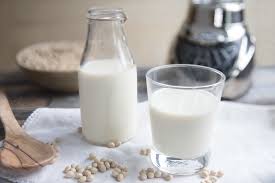Learning about the relationship between dairy and your health

Soy milk, made from the plant soybean, can be a great source of protein without all the negatives of regular milk that typically comes from a cow. Since soy milk is naturally free of cholesterol, it is much better for you than dairy because it will not increase your risk of heart problems and is very low in saturated fat.
April 21, 2020
Dairy is both milk and any other products containing milk, such as yogurt, butter, cheese, and cream. Many people think of dairy as an essential food group that is needed to maintain one’s health; however, is it really that essential to your health?
Although milk and other dairy products are not necessarily unhealthy, there are many health concerns involving these products. One concern is that dairy products are the top source of saturated fat found in the American diet. Saturated fat can be associated with many health risks such as type 2 diabetes and heart disease. The reason for this is that the saturated fat clogs the arteries which leads to many heart problems. One of the worst dairy products to consume is cheese, which is typically made up of 70% fat. Many argue that dairy benefits your bones; however, research has shown that dairy products contribute little to no bone benefits. One study by the NCBI of more than 96,000 people found that more milk consumed by men as teenagers actually led to more bone fractures as adults.
Another concern is your skin’s health. Although many still argue whether acne and dairy have a connection, many new studies have shown that there is indeed a strong association between the two. Researchers found that about 50% of the people who have acne consume dairy, but it never said that it was a definite cause; however, it shows how the two are linked. Many dermatologists suggest a low dairy diet or a diet that consists of no dairy at all to manage acne and breakouts. One theory about the connection is from F. William Danby, MD, who explained that milk contains components related to the hormone testosterone, and this may stimulate the oil glands in your skin causing breakouts.
Your dairy consumption can depend on the type of person and how they might react to milk, as many people are lactose intolerant and have allergies. Lactose intolerance refers to the inability to produce enzymes that break down lactose, which is the sugar found in typical cow milk. There is a great percentage of Americans that struggle with this, but there are other reasons why people may not consume dairy products. Many people also just do not like the taste, including junior Steven Tio, who said, “I hate milk. I have never liked the taste of plain milk, and even as a kid I would always refuse to drink it. The bland taste always made me gag when I drank it. I have always been quite particular about it, allowing myself to only settle for chocolate milk as an alternative.”
Overall, milk is not necessarily bad for you; nonetheless, there are not too many benefits either.











